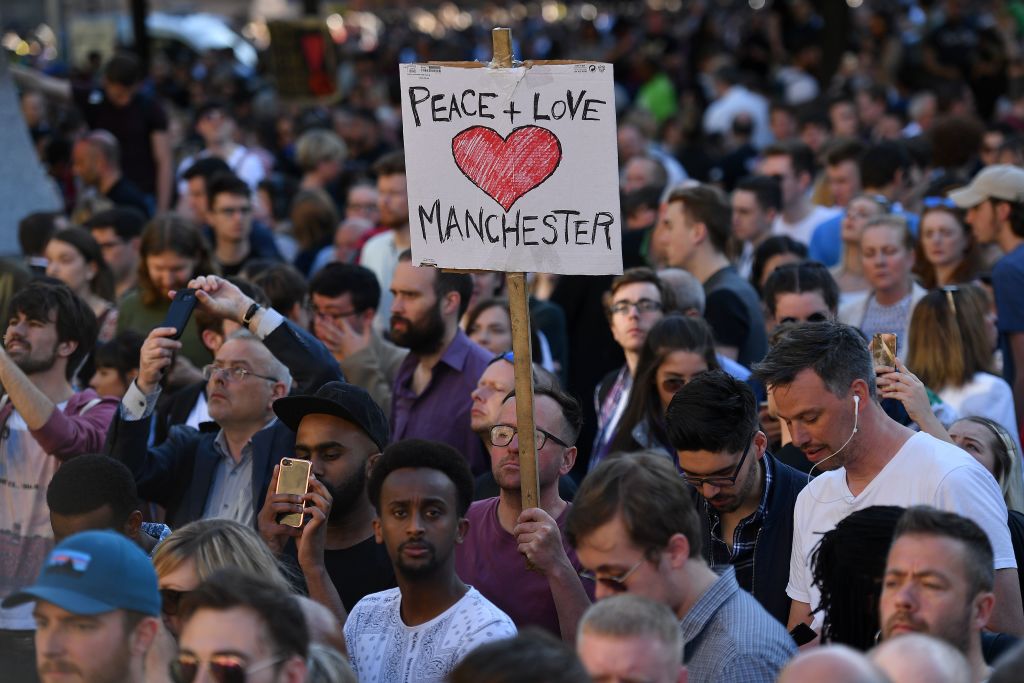On the anniversary of the Manchester Arena bombing all the talk has been of hugs and hearts; of healing and hope; of handholding and heroism. Newsreaders have spoken in self-consciously faltering tones about the resilience and defiance of those who have suffered so much. A choir sang Somewhere over the Rainbow. A minute’s silence, followed by a mass sing-a-long. Trees were decked with messages of hope as Dr Rev David Walker, the bishop of Manchester observed, somewhat obtusely, that “Part of the horror … is that [the arena] appeared to have been deliberately chosen as a venue full of young people”. On Radio 4’s Today programme, Nick Robinson sounded in almost jovial mood as he spoke to grieving victims, Mancunian roots ratcheted up for maximum empathetic effect.
His platitudinous enquiries came to a head when he asked a brave doctor who had treated the wounded that night whether she was ‘finding the anniversary tough’. As with so many recent terrorist attacks we were told of the city’s determination to bring all communities together. A young survivor whose hand had been blown to bits in the blast spoke to Robinson about her wish to remain positive while her mother stated categorically that her daughter’s attacker ‘did not represent the whole of the community that he said that he did’. The on-message hope-not-hate narrative remained present and politically correct throughout.
But with the investigation into the horrors of that night still ongoing where were the dissenting voices; the voices of rage and doubt and existential despair? The voices of those who have yet to come to terms with what happened. Where was the seething sense of injustice; the fury that more had not been done to protect the innocent? Salman Ramadan Abedi, a 22-year-old local man of Libyan ancestry had been under active investigation before carrying out the attack and yet he still managed to disappear under the radar. Where was the outrage about that horrifying piece of injustice? The BBC’s message on these occasions is always one of plucky defiance and of everyone united in ‘hope’. But what about the grieving mothers who simply cannot forgive and who have lost all hope? Or the Ariana Grande concert goers who remain traumatised by the mass slaughter they witnessed that night? And what about the ordinary Mancunians caught up in the carnage who feel they’d like to speak out against a religious doctrine that radicalised one of their own? Don’t these voices deserve to be heard?
They may be uncomfortable to hear but grief is a messy, uncomfortable business and we experience it in many conflicting ways. Yes, some seek solace in the words of John Lennon but others may need an outlet for rawer emotion. Despite what the pundits might say, expressing anger towards your aggressor does not mean your aggressor has won. It’s an argument that belittles legitimate resentments and replaces them with a relentlessly upbeat message of naïve optimism. Sometimes vague messages of hope simply aren’t enough.
This shutting down of understandable indignation only ever seems to happen after terrorist attacks. Witness the ferocity of outrage at the time of the Grenfell disaster and during the opening of the enquiry last week. As with the ongoing Stephen Lawrence investigation, ‘members of the community’ are actively encouraged to show their sense of grievance. You won’t see the likes of David Lammy or Diane Abbott holding hands and singing Judy Garland songs outside Latimer Road tube station. Over on the mean streets of North Kensington all the talk is of justice and retribution. Minds have been made up – the enemy is in sight and those who seek to use Grenfell’s traumatised ‘community’ for their own political advantage can barely contain themselves. Theirs is a completely different kind of defiance. In our increasingly desperate and polarised political arena, it seems even the grief of disaster victims is fair game.






Comments